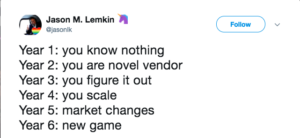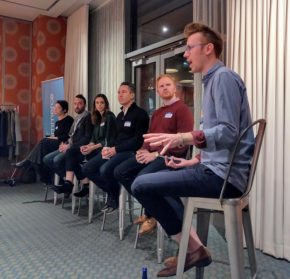
Six years. The tweet below from Jason M. Lemkin pretty much sums it up. You start, you hustle, you make progress, you grow, the market shifts, you start all over again albeit on a new level within the same game.
What makes the start-up game the greatest game on earth is that the chess board recreates itself every day in new unanticipated ways. Nothing stands still — there are new entrants below you, bigger companies above you who now see the opportunities you’ve unearthed, and all the while you must change the tire on a moving car.
Given those challenges, I document a few lessons learned (Year 1, Year 2, Year 3, Year 4, Year 5) for other entrepreneurs on the same arduous path. There is nothing that can fully prepare you for the journey that lies ahead, but this is some of what I’ve learned and I hope it helps you in your endeavors.
Why listen to me? I’ve been in the thick of launching, running, and growing a start-up for the past six years as the Founder and CEO of StackCommerce. In that time, we’ve grown from $0 to $40m in annual revenues, profitably, on less than $1m of venture capital raised. In 2017, we acquired one of our competitors, Joyus.com, who raised over $65m in venture capital.

1. Cannibalize Your Current Business
Given how fast technology evolves today, you must shift before the market does. This seems like an obvious point, but while you’re in it…you get caught up. There are countless examples of “temporary” business models or hacks that work for a while, but then that trend or technology gets passed by in what feels like a blink of an eye. Think about historically top performing companies like Zynga (fb apps), Groupon (daily deals), and Blockbuster (dvd’s) — they dominated until the game changed and were caught focusing on the “old way”.
The only real shot you have of overcoming this is to cannibalize your current business with a new product/feature that leapfrogs your current offering. There will be a lot of pushback from your team because most of them would rather improve “what’s working” in lieu of the challenge of losing focus on the core business. It’s a valid argument and takes a lot of trust on both sides to get through.
One thing we do to flush out these types of “moonshot” ideas is running bi-annual “Hack Days”. People get a chance step away from the day-to-day and work on side projects / features / culture hacks that they don’t typically have time for. This year, our hackday resulted in one of the most important features we’ve every released!
2. Life Will Happen to You
When I started Stack, I was single and could spend 100% of my time however I wanted. I dedicated almost my entire thought process 24/7 to my start-up — happily. A few years later, I got engaged. Then I got married. Then we had our first child. Then we a second kid. All within three years! Talk about life happening.
For me, the transition to fatherhood initially felt like an attack on my identity as an entrepreneur. I simply couldn’t juggle everything. But in time, I saw how the challenges of constraining my time and energy forced me to be more purposeful and hire more talented leaders to push forward.
Whether your life event is the birth of a child, the loss of someone important to you, a health scare, etc … realize that you are not a robot. You are not immune to life outside your start-up. When life does happen to you (and it will), the important thing is that you’ve built a team that can carry your vision forward with or without you. For many years, I made our business dependent on me and manifested that in my team. I’m still untangling that mess. But, now I have other life priorities that outweigh what I believed was my only priority for so many years.
3. Concentrate Your Resources
When building your initial MVP, it’s crucial to ensure that you’re building for a large, growing market. For instance, when we first built StackSocial it was purely for desktop Mac software apps. I didn’t know it at the time, but that market would get eviscerated by the shift from desktop to mobile app adoption. We quickly expanded into other categories such as online learning, games, gadgets, etc…but instead of going deep in one area, we went wide across categories. This is incredibly tough to do.
Starting in a niche is smart, but if the market you are in is “too small”, then you constantly have to chase new buckets of revenue. Going deep in one category enables you to “do less, better”. So, while that new field looks like greener pastures, it will be much harder once you get there than simply improving upon and expanding within your current market.
4. Better, Faster, & Cheaper?
Not a chance. You’ll be lucky to be one of those and if you are great, you will likely be two of the three. Know which ones you are and own it. Your company values and mission should align to your priorities and will ensure that everyone in the company knows which ones you’ve chosen.
For us, this involves taking the team for a full day off-site where we take a look back and see how we’ve evolved as a team and how our mission, vision, and values need to evolve as well. This year we hired an Executive Coaching Firm, Novus Global, to run a workshop on the topic with us.
It’s not cheap, but it’s well worth the investment.
People who are inspired with a deeper mission will continue to fight long after those who are only focused on the tactics. If you notice your team zoning out, it’s likely because they aren’t connecting the dots of their “daily grind” to a more meaningful reason to do the work. Connect your personal reason for being to a shared goal and you will see a different response.
Last piece of advice, own your trade-offs just as much as you do the traits you are claiming and pursuing. The more you attempt to be everything to everyone, the less people will know who you are and it will dilute your brand and your mission.
To wrap things up, here are a few #humblebrags on my team and some accomplishments over the past year:
6th Year Highlights:
- 2017 Finalist for ‘Best eCommerce Strategy’ — Digiday Publishing Awards
- 2017 Best Places to Work in LA by LA Business Journal & Comparably.com
- 2017 Finalist for the Los Angeles EY Entrepreneur of the Year Award
- Partnered & integrated shops on 50+ new prominent publishers including CNN, Mashable, CBSi, Gannett, Scripps, & others
- Acquired Joyus.com (who raised over $65m in venture capital) to expand into video commerce and add to our women’s lifestyle offering
- Grew registered members on our platform to over 5.5 million members
Onward and Upward! #stackup
JP


